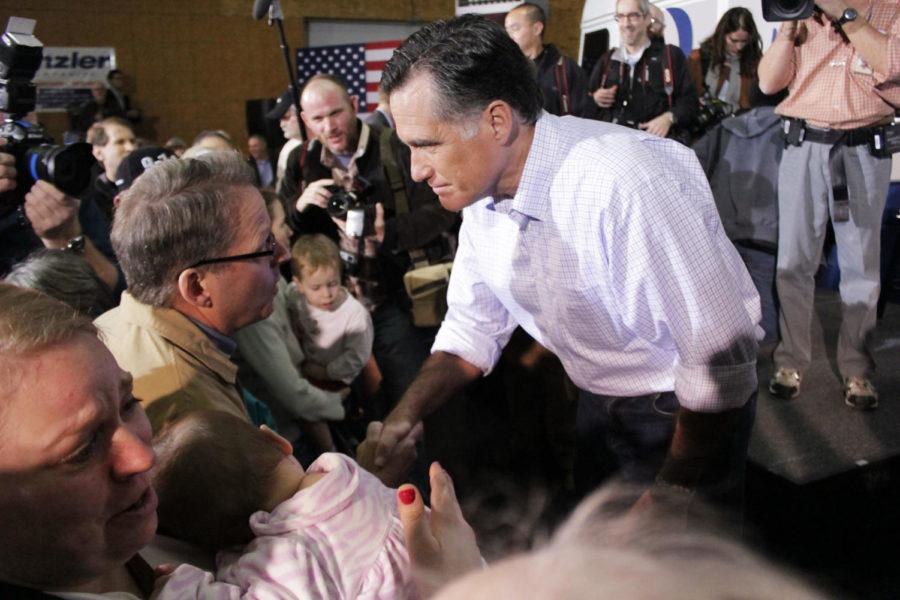Primaries fall in Romney’s favor
Mitt Romney, former Republican governor of Massachusetts, meets with supporters during a campaign stop at Kinzler Construction in Ames on Thursday, Dec. 29. Romney was the projected winner in primaries in Maryland, Wisconsin and Washington D.C. on April 3.
April 3, 2012
Tuesday saw Republican primaries in Wisconsin, Maryland, and Washington, D.C. All ended with the same result: Mitt Romney won over Rick Santorum, while Ron Paul and Newt Gingrich fell in behind.
Wisconsin, worth 42 delegates, was won by a three-point margin, with 10 percent reporting.
Maryland was a larger victory for Romney, with a 20 percent win over Santorum, at 14 percent reporting. Washington, D.C., followed suit with Romney winning more than 65 percent of the vote, at 28 percent reporting.
“Mitt Romney’s going to be the Republican nominee,” said James Strohman, professor of political science. “I think that gets clearer every week.”
The current delegate count shows Romney in the lead with 670 followed by Santorum, whose count adds up to 272.
Gingrich sits in third with 135, and Paul is at the tail with only 51 delegates.
Although Romney won every state Tuesday, not all of the delegates go to him.
Steffen Schmidt, university professor of political science, explained how the delegate system works for this year’s election.
“The Republicans decided to allocate delegates to the convention proportionately to how well candidates do the in the primaries,” Schmidt said. “That means that even if Romney, now considered the front-runner, does very well, he will still only get a percentage of the delegates in these 10 states.”
Although Romney seems to be the eventual candidate, the others will not step down quickly.
“[Paul] will continue doing the things he’s always done,” Strohman said. “Newt Gingrich just really despises Mitt Romney and he has no intention of getting out of the race until the last minute, although it’s pretty clear that he’s almost completely run out of money. They have been letting staff go for a couple weeks. He has almost no chance of winning.”
The only apparent threat to Romney is Santorum, although that threat is much less now than what it was even a month ago.
“Rick Santorum is the alternative to Romney from the conservative base, and they want their candidate to stay in because they want to try to press the GOP to be more conservative in their approach to running the fall campaign,” Strohman said.
Although the candidates all seem content with continuing the race for now, that may change before the Republican National Convention, which starts Aug. 27. It is here where the nominee will officially be selected and accept the nomination.
“Romney will probably go to the top before the convention,” Strohman said. “We’re going to continue to see more and more of the leadership credentials of the party, particularly elected officials, senators, members of Congress and governors endorse Romney because they want to close this as well.”
The GOP currently seems divided over who to elect, but these differences are not deep enough to destroy a chance for a Republican president.
“I think at the point of time when Romney gets the nomination, [the turmoil] will end within the GOP and they will go out and campaign for him,” Strohman said.

















